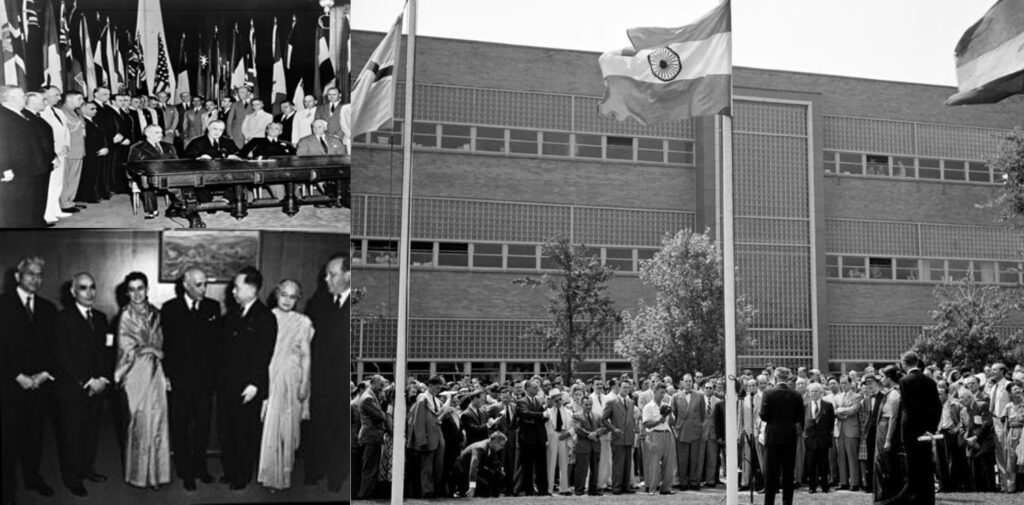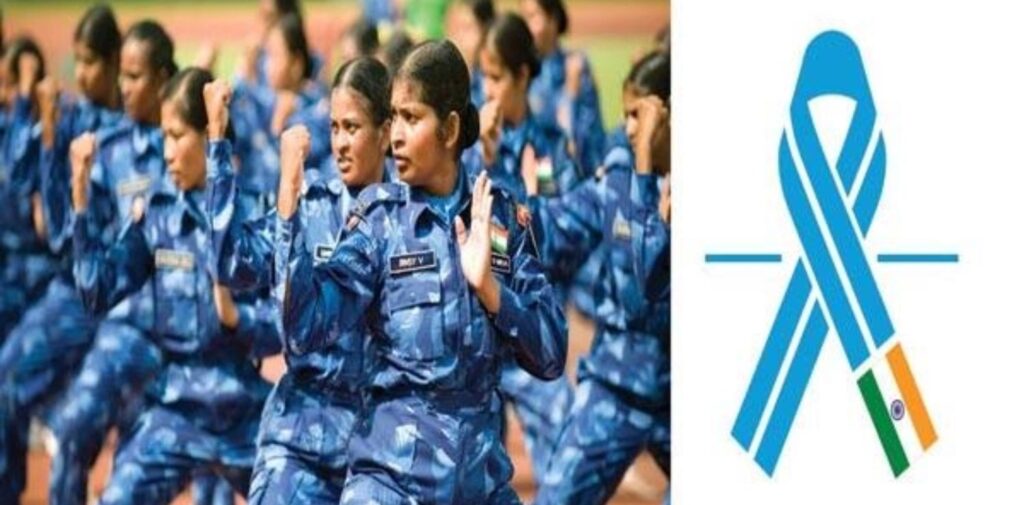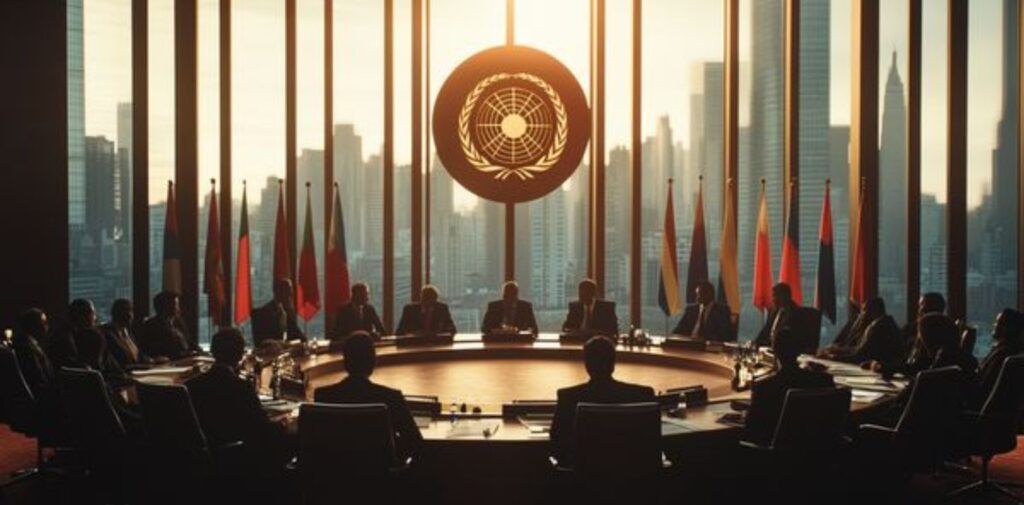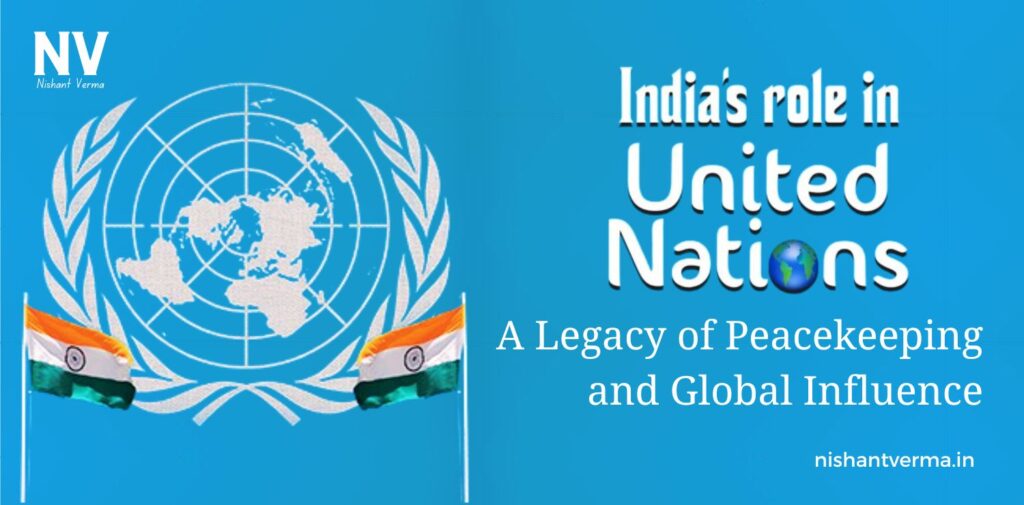The United Nations (UN) is an international organization that aims to promote peace, security, human rights, and cooperation among the nations of the world. Established on October 24, 1945, following the devastation of World War II, the UN’s primary goal is to prevent future conflicts and ensure the well-being of people worldwide. India, a key player in global politics, became a member of the United Nations shortly after its independence and has since played an important role in shaping the direction of international diplomacy, peacekeeping, and development. This article delves into India Role in the United Nations in 1945, its contributions to UN peacekeeping efforts, and its involvement in various UN initiatives today.
India’s Accession to the United Nations
India gained independence from British colonial rule on August 15, 1947. At the time, the world was witnessing the aftermath of World War II, and there was an urgent need for international cooperation to rebuild nations and prevent further global conflict. The United Nations was formed in 1945 with the hope of creating a forum where countries could come together to discuss issues peacefully, rather than resorting to war.
India was one of the founding members of the UN, joining shortly after its independence. India’s decision to join the United Nations was influenced by its commitment to global peace, democracy, and human rights. India had long been a proponent of peaceful coexistence and had fought against colonial rule, so it was natural for the country to align itself with the global vision of a just and peaceful world.
India became a member of the United Nations on October 30, 1945, just a few weeks after the organization was founded. India’s accession marked an important moment in the history of the United Nations, as it signaled the beginning of the active involvement of newly independent countries in the global diplomatic arena.

India’s Contribution to UN Peacekeeping
One of India’s most significant contributions to the United Nations has been in the field of peacekeeping. India has consistently supported the UN’s peacekeeping missions and has been one of the largest contributors of troops to these missions. The country’s peacekeeping efforts reflect its commitment to maintaining global peace and stability.
India’s First Peacekeeping Mission
India’s first major involvement in a UN peacekeeping mission came in 1948, when the UN established the United Nations Military Observer Group in India and Pakistan (UNMOGIP) to monitor the ceasefire between India and Pakistan after the first Kashmir conflict. India played a crucial role in ensuring the smooth functioning of this mission, and this laid the foundation for the country’s long-term involvement in UN peacekeeping.

India Role in the United Nations Peacekeeping Today
Over the decades, India has participated in numerous peacekeeping missions around the world, including in regions such as Africa, the Middle East, and the Balkans. India is one of the largest contributors of personnel to UN peacekeeping operations. As of today, India has deployed over 200,000 soldiers in 49 peacekeeping missions across the globe, making it one of the top contributors to UN peacekeeping forces.
India’s contributions have not been limited to just providing troops. India has also played a leadership role in various peacekeeping missions. For example, India has commanded a number of peacekeeping forces, such as in Congo, Lebanon, and Sierra Leone. Indian peacekeepers are known for their professionalism, impartiality, and commitment to upholding human rights, which has earned them respect and admiration in the international community.
India’s commitment to peacekeeping is further reflected in its participation in the UN Department of Peace Operations (DPO), which oversees peacekeeping missions. India has also been an advocate for increasing the capacity and resources for UN peacekeeping forces to ensure that they are better equipped to deal with complex modern conflicts.
The Indian Approach to Peacekeeping
India’s approach to peacekeeping is guided by its strong belief in non-violence (ahimsa) and cooperation. Indian peacekeepers are not just soldiers; they also provide humanitarian aid, medical assistance, and help in rebuilding war-torn societies. This holistic approach to peacekeeping has made India a trusted partner in the UN’s global peace efforts.
India has also advocated for reform of the UN Peacekeeping operations to make them more effective. India believes that peacekeeping missions must focus not just on military solutions, but also on nation-building and conflict resolution to address the root causes of conflicts.
India’s Role in UN Initiatives and Global Diplomacy
Apart from peacekeeping, India has been an active participant in various other UN initiatives aimed at addressing global challenges such as poverty, climate change, health, education, and human rights. India’s role in shaping the UN’s agenda has been substantial, especially as it continues to grow as a global economic power.
- Human Rights and Social Development: India has been a strong advocate for human rights and social justice in the United Nations. It has played an active role in the UN Human Rights Council (UNHRC), which monitors and addresses human rights issues around the world. India has worked towards ensuring that the voices of developing countries are heard and that human rights are promoted not just in the Western world but globally. India is also committed to achieving the UN Sustainable Development Goals (SDGs), a set of 17 goals established by the UN in 2015 to promote global peace, prosperity, and equality. India has made significant progress in areas such as education, healthcare, poverty reduction, and women’s empowerment, all of which are key focus areas of the SDGs. India has pledged to meet these goals by 2030, and its domestic policies are aligned with the UN’s global vision for sustainable development.
- Climate Change and Environmental Sustainability: India has been an active participant in UN initiatives focused on climate change and environmental sustainability. India was a key player in the Paris Agreement on climate change in 2015, which aims to limit global warming to well below 2°C above pre-industrial levels. India has committed to reducing its carbon footprint, transitioning to renewable energy, and promoting green technologies. India’s role in climate diplomacy is also reflected in its leadership of the International Solar Alliance (ISA), a group of countries working together to promote the use of solar energy. The ISA, which was launched by India in 2015, is an important initiative in addressing climate change and promoting sustainable energy solutions.
- Peace and Security in the 21st Century: India has also been a strong proponent of global security reform in the UN. India has consistently called for reforms in the UN Security Council, particularly with regard to the expansion of permanent membership. India, with its large population, growing economy, and contributions to peacekeeping, has argued that it deserves a seat at the table in the UN Security Council to have a more influential voice in global security matters.

Challenges and Future Prospects
While India has played an important role in the United Nations, it faces challenges in advancing its interests, particularly in the context of global power dynamics. The UN system is often criticized for being slow to adapt to the changing global order, and India has been advocating for reform of the UN to reflect the contemporary geopolitical landscape.
In the future, India is likely to continue playing a leading role in shaping the UN’s agenda, particularly in areas such as peacekeeping, development, climate change, and security. India’s growing influence on the world stage means that its contributions to the UN will be even more critical in the coming years.
Conclusion
India’s journey with the United Nations began in 1945, and since then, the country has made significant contributions to the organization’s efforts to promote global peace, security, and development. India’s commitment to peacekeeping, human rights, and sustainable development has made it one of the most important members of the United Nations. As India continues to rise as a global power, its role in the UN will likely continue to evolve, influencing the organization’s future in shaping a more peaceful, just, and sustainable world for all.
India’s work in the United Nations serves as a testament to its long-standing commitment to diplomacy, peace, and international cooperation. The country’s contributions reflect its belief in a world where nations can work together to overcome challenges and build a brighter future for all.




